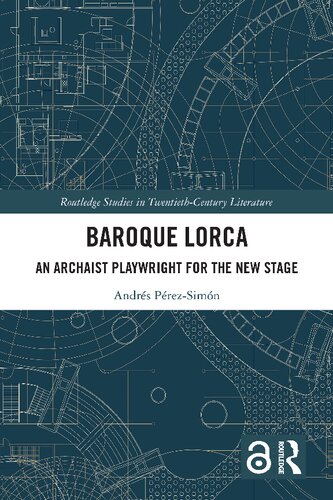

Most ebook files are in PDF format, so you can easily read them using various software such as Foxit Reader or directly on the Google Chrome browser.
Some ebook files are released by publishers in other formats such as .awz, .mobi, .epub, .fb2, etc. You may need to install specific software to read these formats on mobile/PC, such as Calibre.
Please read the tutorial at this link: https://ebookbell.com/faq
We offer FREE conversion to the popular formats you request; however, this may take some time. Therefore, right after payment, please email us, and we will try to provide the service as quickly as possible.
For some exceptional file formats or broken links (if any), please refrain from opening any disputes. Instead, email us first, and we will try to assist within a maximum of 6 hours.
EbookBell Team

4.8
14 reviewsBaroque Lorca: An Archaist Playwright for the New Stage defines Federico García Lorca’s trajectory in the theater as a lifelong search for an audience. It studies a wide range of dramatic writings that Lorca created for the theater, in direct response to the conditions of his contemporary industry, and situates the theory and praxis of his theatrical reform in dialogue with other modernist renovators of the stage. This book makes special emphasis on how Lorca engaged with the tradition of Spanish Baroque, in particular with Cervantes and Calderón, to break away from the conventions of the illusionist stage. The five chapters of the book analyze Lorca’s different attempts to change the dynamics of the Spanish stage from 1920 to his assassination in 1936: His initial incursions in the arenas of symbolist and historical drama (The Butterfly’s Evil Spell, Mariana Pineda); his interest in puppetry (The Billy-Club Puppets and In the Frame of Don Cristóbal) and the two ‘human’ farces The Shoemaker’s Prodigious Wife and The Love of Don Perlimplín and Belisa in the Garden; the central piece in his project of ‘impossible’ theater (The Public); his most explicitly political play, one that takes the violence to the spectators’ seats (The Dream of Life); and his three plays adopting, an altering, the contemporary formula of ‘rural drama’ (BloodWedding, Yerma and The House of Bernarda Alba).
Chapter 5 of this book is freely available as a downloadable Open Access PDF under a Creative Commons Attribution-Non Commercial-No Derivatives 4.0 license.